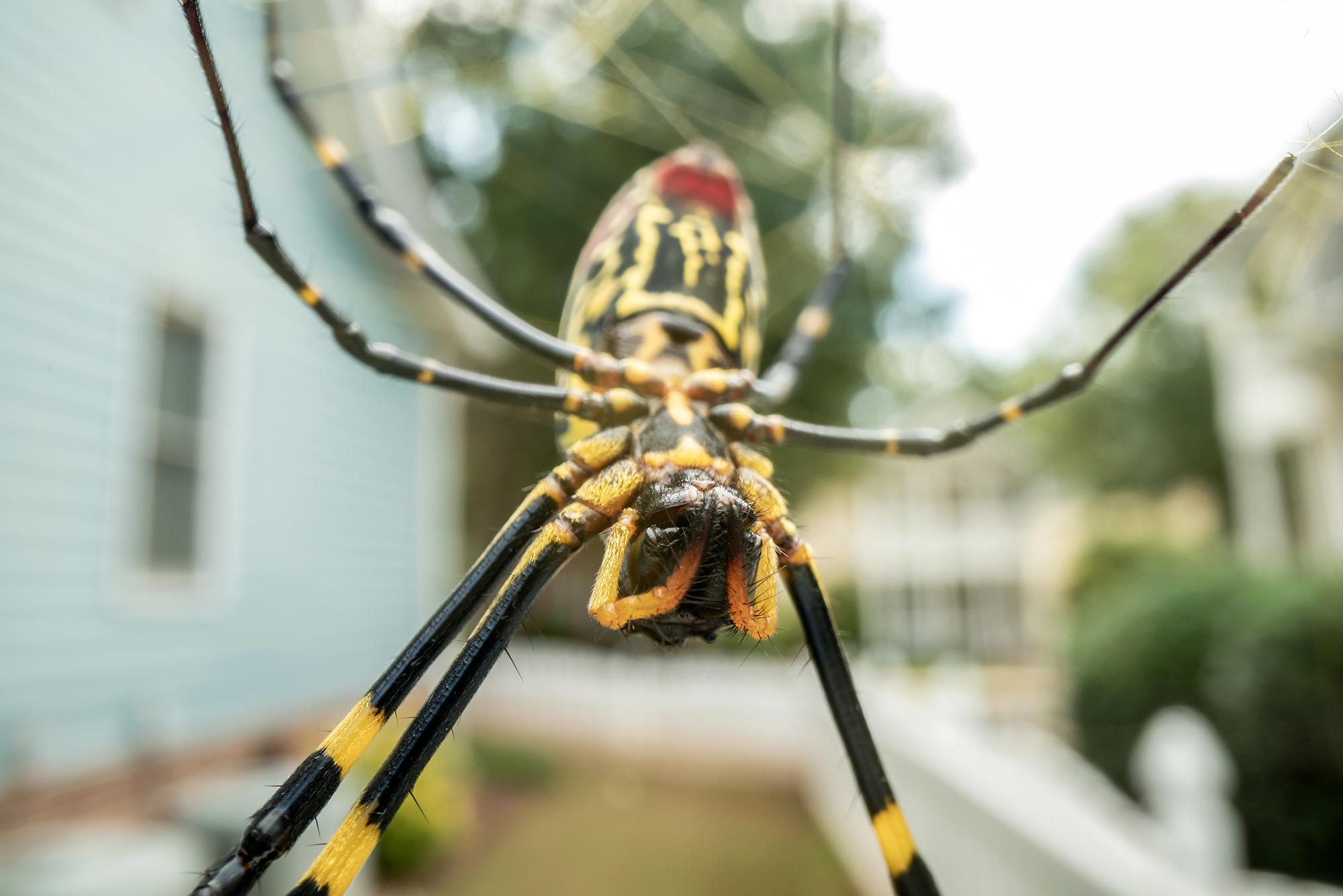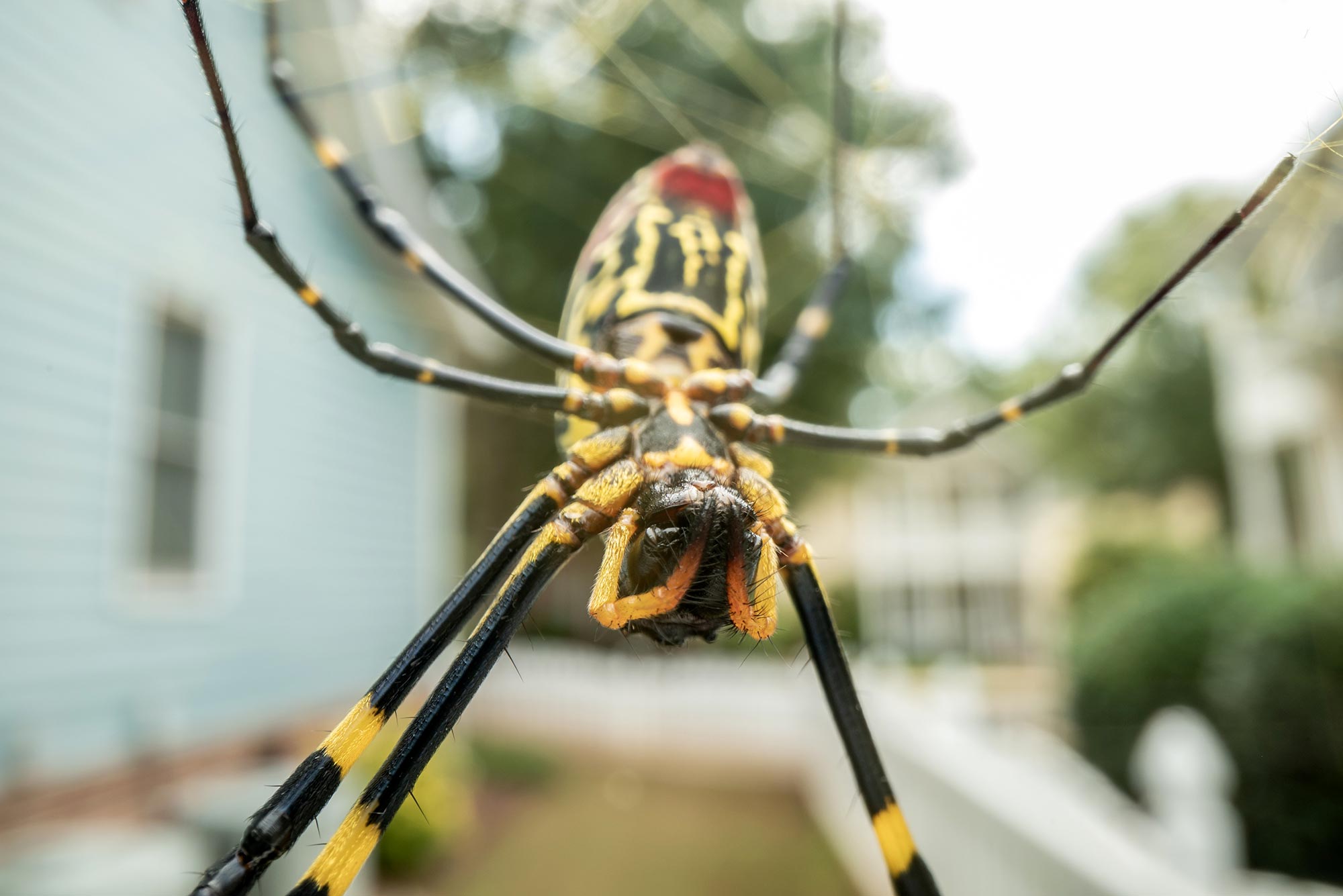
Η αράχνη γκουρού, παρά τη γρήγορη εξάπλωση και το μεγάλο της μέγεθος, δεν είναι επιθετική αλλά είναι απίστευτα ντροπαλή. Αυτή η αράχνη από την Ανατολική Ασία, που κατοικεί τώρα στις νοτιοανατολικές Ηνωμένες Πολιτείες, παγώνει όταν ενοχλείται και ευδοκιμεί σε αστικά περιβάλλοντα λόγω της ντροπαλής φύσης και της μεγάλης αναπαραγωγικής της δυνατότητας.
Μια νέα μελέτη δείχνει ότι οι αράχνες είναι ήπιοι γίγαντες, πράγμα που σημαίνει ότι οι άνθρωποι δεν τις βλάπτουν.
Η αράχνη γκουρού, παρά το τρομακτικό της μέγεθος και την ταχεία εξάπλωσή της στις νοτιοανατολικές Ηνωμένες Πολιτείες, είναι εκπληκτικά ντροπαλή σύμφωνα με μια μελέτη από το Πανεπιστήμιο της Τζόρτζια. Σε αντίθεση με την αρχική εικασία, η αράχνη Joro δεν είναι επιθετική, αλλά παγώνει για πάνω από μία ώρα όταν ενοχλείται, πολύ περισσότερο από τις περισσότερες αράχνες. Αυτή η αράχνη, η οποία είναι εγγενής στην Ανατολική Ασία, πιστεύεται ότι έφτασε στη Γεωργία γύρω στο 2013 μέσω ενός κοντέινερ και από τότε εξαπλώθηκε σε όλη την πολιτεία.
Παρά την τρομακτική εμφάνισή τους, οι γιγάντιες κίτρινες, μπλε και μαύρες αράχνες που είναι κοινές σε όλες τις νοτιοανατολικές Ηνωμένες Πολιτείες οφείλουν την επιβίωσή τους σε ένα εκπληκτικό χαρακτηριστικό: Είναι κάπως ντροπαλές.
Σύμφωνα με μια νέα μελέτη από το Πανεπιστήμιο της Τζόρτζια, η αράχνη Jorō (Joro) μπορεί να είναι η πιο ντροπαλή αράχνη που έχει τεκμηριωθεί ποτέ.
«Ένας από τους τρόπους με τους οποίους οι άνθρωποι πιστεύουν ότι αυτή η αράχνη μπορεί να επηρεάσει άλλους ανθρώπους[{” attribute=””>species is that it’s aggressive and out-competing all the other native spiders,” said Andy Davis, lead author of the study and a research scientist in UGA’s Odum School of Ecology. “So we wanted to get to know the personality of these spiders and see if they’re capable of being that aggressive.
“It turns out they’re not.”

While most spiders begin moving again shortly after being disturbed, Joro spiders like the one here remain immobile for more than an hour. Credit: Peter Frey/UGA
The researchers compared more than 450 spiders’ responses to a brief and harmless disturbance across 10 different species.
While most spiders froze for less than a minute before resuming their normal activities, the Joro spiders remained motionless for more than an hour.
“They basically shut down and wait for the disturbance to go away,” Davis said. “Our paper shows that these spiders are really more afraid of you than the reverse.”
In fact, Joros are relatively harmless to people and pets. Joros won’t bite unless cornered. And even if you did manage to somehow annoy a Joro into biting you, its fangs likely wouldn’t be large enough to pierce your skin.
Most spiders begin moving quickly after stress, Joros remain immobile for 60-plus minutes
To examine the spiders’ reaction to stress, the researchers used a turkey baster to gently blow two rapid puffs of air onto individual spiders. This minor disturbance causes the spiders to “freeze” for a period of time, going absolutely still.
The researchers tested more than 30 garden spiders, banded garden spiders, and marbled orb weavers. They also analyzed similar data from previously published, peer-reviewed papers that assessed the response of 389 more spiders, comprising five additional species.

A female Joro spider spins its web. The 30mm scale bar is included for size reference. Credit: Jeremy Howell
All of those spiders began moving again after an average of about a minute and half of stillness.
The Joros, however, stayed frozen with no body or leg movement for over an hour in most cases.
The only other spider species that exhibited a similarly extended response was the Joro spider’s cousin, the golden silk spider. Known as Trichonephila clavipes, the golden silk spider and the Joro spider are from the same genus.
Joros may be invasive, but they’re not aggressive
Officially known as Trichonephila clavata, the East Asian Joro spider first arrived in Georgia around 2013. The species is native to Japan, Korea, Taiwan and China, and likely hitched a ride stateside on a shipping container.
The species has since rapidly spread across the state and much of the Southeast. Joro spiders easily number in the millions now. And there’s not much we can do to stop them from increasing their range.

A Joro spider feasts on a caterpillar. Credit: University of Georgia
Davis’ previous research even suggested the invasive arachnids could spread beyond their current habitats and through most of the Eastern Seaboard.
“Most people think ‘invasive’ and ‘aggressive’ are synonymous,” said Amitesh Anerao, co-author of the study and an undergraduate researcher at the university. “People were freaking out about the Joro spiders at first, but maybe this paper can help calm people down.”
Joro spiders built to withstand human activity
Joros are regularly spotted in areas native Georgia spiders don’t typically inhabit.
They build their golden webs between powerlines, on top of stoplights and even above the pumps at local gas stations—none of which are particularly peaceful spots.

Sunlight streams through the elaborate webs made by Joro spiders. Credit: University of Georgia
The researchers believe the Joro spiders’ shyness may help them better endure the barrage of noise, vibrations and visual stimuli they consistently encounter in urban settings. Their prolonged freeze response to being startled could help conserve the Joro spiders’ energy.
“They’re so good at living with humans that they’re probably not going away anytime soon.” — Amitesh Anerao
If you’re wondering how something so mild-mannered could spread the way Joro spiders have, you aren’t the only one.
“One thing this paper tells me is that the Joros’ rapid spread must be because of their incredible reproductive potential,” Davis said. “They’re simply outbreeding everybody else. It’s not because they’re displacing native spiders or kicking them out of their own webs.”
Arachnophobes can take solace in the Joro spiders’ meek and gentle temperament. But the spiders are likely here to stay.
“They’re so good at living with humans,” Anerao said, “that they’re probably not going away anytime soon.”
Reference: “Startle Responses of Jorō Spiders (Trichonephila clavata) to Artificial Disturbance” by Andrew K. Davis and Amitesh V. Anerao, 15 May 2023, Arthropoda.
DOI: 10.3390/arthropoda1020009

“Ερασιτέχνης διοργανωτής. Εξαιρετικά ταπεινός web maven. Ειδικός κοινωνικών μέσων Wannabe. Δημιουργός. Thinker.”



